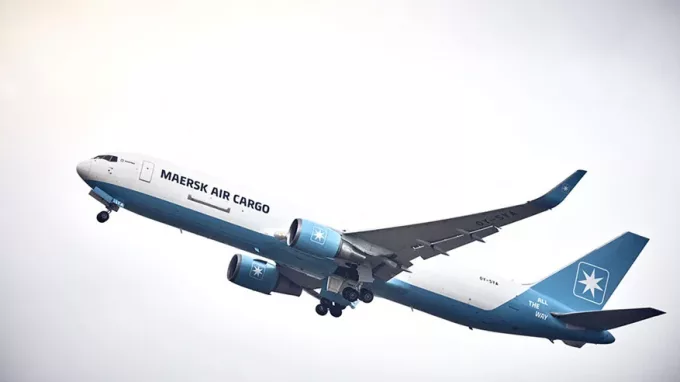Emirates orders five more 777Fs, as Boeing strike looks set to end
Emirates has announced a freighter order – and perhaps surprisingly, given current news, has opted ...
GM: RAISING THE ROOF GGM: IN FULL THROTTLE GZIM: MAERSK BOOST KNIN: READ-ACROSSMAERSK: NOT ENOUGHMAERSK: GUIDANCE UPGRADEZIM: ROLLERCOASTERCAT: HEAVY DUTYMAERSK: CATCHING UP PG: DESTOCKING PATTERNSPG: HEALTH CHECKWTC: THE FALLGXO: DEFENSIVE FWRD: RALLYING ON TAKEOVER TALKODFL: STEADY YIELDVW: NEW MODEL NEEDEDWTC: TAKING PROFIT
GM: RAISING THE ROOF GGM: IN FULL THROTTLE GZIM: MAERSK BOOST KNIN: READ-ACROSSMAERSK: NOT ENOUGHMAERSK: GUIDANCE UPGRADEZIM: ROLLERCOASTERCAT: HEAVY DUTYMAERSK: CATCHING UP PG: DESTOCKING PATTERNSPG: HEALTH CHECKWTC: THE FALLGXO: DEFENSIVE FWRD: RALLYING ON TAKEOVER TALKODFL: STEADY YIELDVW: NEW MODEL NEEDEDWTC: TAKING PROFIT

Of the new flying shipping lines, Maersk Air Cargo seems to be leading the field, with confident steps towards growth.
The liner-forwarder-integrator is set to receive another aircraft shortly and is increasing frequencies and capacity on its key routes, it said.
Its transpacific corridor between Chicago Rockford and Hangzhou Xiaoshen will see weekly rotations double, to six, and its weekly rotations between Greenville-Spartanburg, via its Senator operations, to Incheon and Shenyang Taoxian, will rise from two to three.
Maersk Air Cargo is also set to start operating the fifth of six 767 freighters ordered initially, which will go on its Billund-Hangzhou route, boosting weekly rotations from three to five.
“The introduction of an additional aircraft together with a substantial increase in rotations will further expand our ability to service our customers with regular flights and controlled capacity,” said Michel Pozas Lucic, global head of air.
“At the same time, we are further strengthening our position as a truly customer-driven partner in the global air freight market.”
And Maersk noted its air freight lanes were “customer-backed” – indicating a degree of guaranteed demand.
Its sea-going rivals, however, seem less sure-footed in the skies.
Sources have told The Loadstar there have been some recent staff changes at CMA CGM Air Cargo, with three managers quitting and more expected to follow.
They said: “There have been quite a few changes and not everyone is happy with some of the new people on board. I don’t think it’s specifically about working with AF-KLM, but some people aren’t so keen on the joint-venture either.”
That joint-venture doesn’t cover North America – and neither does CMA CGM, after pulling its routes last year.
The French group does not break out its financials by air specifically, but bunches it with terminals and ‘other’, including ‘media’. It announced its Q1 results last month, with revenues from ‘other activities’ growing 5.3% over the previous year.
Ebitda, however, fell 47%, to $84m, which CMA said was due to the “easing of port congestion”. It did not mention air, other than saying it was “in line with the market”.
MSC Air Cargo, meanwhile, still has just one 777. It is keeping its air operations at arms’ length: Atlas Air is operating the flights on an ACMI basis; and MSC has signed GSSA group ECS to manage the commercial aspect of the flights in Europe, North America and Mexico. A second 777 is expected to arrive in Atlas’s fleet shortly.
Comment on this article